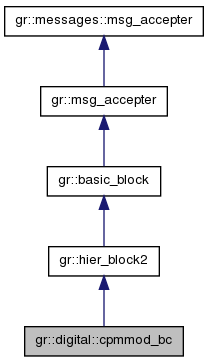Generic CPM modulator. More...
#include <cpmmod_bc.h>

Public Types | |
| typedef boost::shared_ptr < cpmmod_bc > | sptr |
Public Member Functions | |
| virtual std::vector< float > | taps () const =0 |
| Return the phase response FIR taps. | |
| virtual int | type () const =0 |
| Return the type of CPM modulator. | |
| virtual float | index () const =0 |
| Return the modulation index of the modulator. | |
| virtual int | samples_per_sym () const =0 |
| Return the number of samples per symbol. | |
| virtual int | length () const =0 |
| Return the length of the phase duration (in symbols) | |
| virtual double | beta () const =0 |
| Return the value of beta for the modulator. | |
Static Public Member Functions | |
| static sptr | make (analog::cpm::cpm_type type, float h, int samples_per_sym, int L, double beta=0.3) |
| static sptr | make_gmskmod_bc (int samples_per_sym=2, int L=4, double beta=0.3) |
Detailed Description
Generic CPM modulator.
Examples:
- Setting h = 0.5, L = 1, type = LREC yields MSK.
- Setting h = 0.5, type = GAUSSIAN and beta = 0.3 yields GMSK as used in GSM.
The input of this block are symbols from an M-ary alphabet +/-1, +/-3, ..., +/-(M-1). Usually, M = 2 and therefore, the valid inputs are +/-1. The modulator will silently accept any other inputs, though. The output is the phase-modulated signal.
Member Typedef Documentation
Member Function Documentation
| virtual double gr::digital::cpmmod_bc::beta | ( | ) | const [pure virtual] |
Return the value of beta for the modulator.
| virtual float gr::digital::cpmmod_bc::index | ( | ) | const [pure virtual] |
Return the modulation index of the modulator.
| virtual int gr::digital::cpmmod_bc::length | ( | ) | const [pure virtual] |
Return the length of the phase duration (in symbols)
| static sptr gr::digital::cpmmod_bc::make | ( | analog::cpm::cpm_type | type, |
| float | h, | ||
| int | samples_per_sym, | ||
| int | L, | ||
| double | beta = 0.3 |
||
| ) | [static] |
Make CPM modulator block.
- Parameters:
-
type The modulation type. Can be one of LREC, LRC, LSRC, TFM or GAUSSIAN. See gr_cpm::phase_response() for a detailed description. h The modulation index.  is the maximum phase change that can occur between two symbols, i.e., if you only send ones, the phase will increase by
is the maximum phase change that can occur between two symbols, i.e., if you only send ones, the phase will increase by  every
every samples_per_symsamples. Set this to 0.5 for Minimum Shift Keying variants.samples_per_sym Samples per symbol. L The length of the phase duration in symbols. For L=1, this yields full- response CPM symbols, for L > 1, partial-response. beta For LSRC, this is the rolloff factor. For Gaussian pulses, this is the 3 dB time-bandwidth product.
| static sptr gr::digital::cpmmod_bc::make_gmskmod_bc | ( | int | samples_per_sym = 2, |
| int | L = 4, |
||
| double | beta = 0.3 |
||
| ) | [static] |
Make GMSK modulator block.
The type is GAUSSIAN and the modulation index for GMSK is 0.5. This are populated automatically by this factory function.
- Parameters:
-
samples_per_sym Samples per symbol. L The length of the phase duration in symbols. For L=1, this yields full- response CPM symbols, for L > 1, partial-response. beta For LSRC, this is the rolloff factor. For Gaussian pulses, this is the 3 dB time-bandwidth product.
| virtual int gr::digital::cpmmod_bc::samples_per_sym | ( | ) | const [pure virtual] |
Return the number of samples per symbol.
| virtual std::vector<float> gr::digital::cpmmod_bc::taps | ( | ) | const [pure virtual] |
Return the phase response FIR taps.
| virtual int gr::digital::cpmmod_bc::type | ( | ) | const [pure virtual] |
Return the type of CPM modulator.
The documentation for this class was generated from the following file:
